Political parties, preparations for elections, relations with Cuba and Russia in President's Week
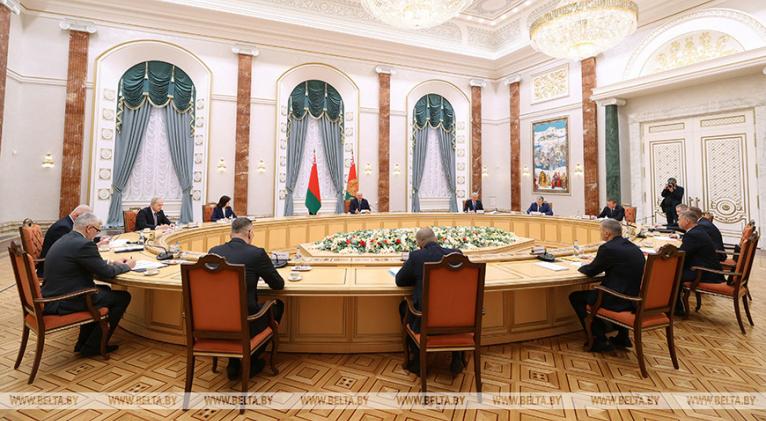
The work schedule of the Belarus president is always full of events. Aleksandr Lukashenko holds conferences and working meetings on the most topical matters concerning the country's development, regularly visits the regions, goes on foreign trips and welcomes foreign guests, talks to reporters, signs decrees and laws. And even if there are no public events, it does not mean that the head of state does not work. It must be said that even when he relaxes, for instance, by playing ice hockey or chopping firewood, Aleksandr Lukashenko happens to find the time to give yet another instruction. All the decisions must be prompted by life, he likes to say.
The President's Week project is intended for those, who want to keep up with the head of state, be up-to-date on the latest statements and decisions of the Belarusian leader.
Why is October Revolution Day relevant for modern Belarus and what should not be forgotten?
Will Russia's Stavropol territory become a reliable outpost for advancing Belarus' cooperation with southern regions of the Russian Federation? When will aircraft fly from Minsk to Mineralnye Vody?
What did Aleksandr Lukashenko discuss with the speaker of the Council of the Republic and how was it related to the forthcoming elections and personnel appointments?
Belarus-Cuba relations. Why is economic cooperation way behind political cooperation for now? What does the president suggest for fixing the situation? Details of negotiations with the Cuban prime minister.
The president's statements about the development of the political party system. What is the peculiarity of the Belarusian way? What did the cleansing of the playing field produce? What recipe of success did Aleksandr Lukashenko formulate as he met with leaders of Belarusian political parties?
IDEALS OF THE OCTOBER REVOLUTION. Why is the October Revolution still relevant for Belarus and the world?
On 7 November Belarus President Aleksandr Lukashenko traditionally sent greetings to fellow Belarusians on the occasion of October Revolution Day.
BelTA reported earlier that several days before the holiday Aleksandr Lukashenko visited the Belarusian nuclear power plant in Ostrovets District, Grodno Oblast as the commercial operation of the nuclear power plant's second unit began and the entire nuclear power plant project was finally completed. It was the key gift the Belarusian nation had received ahead of 7 November. The tradition of inaugurating landmark facilities ahead of important dates has been preserved in sovereign Belarus since the USSR days.
On the occasion of this holiday Belarusians received not only a source of pure nuclear energy. They also received tens of gifts in various parts of the country: roads and bridges, kindergartens and polyclinics, sport and manufacturing facilities.
In his congratulatory address to compatriots Aleksandr Lukashenko stressed that even more than 100 years after the Great October Revolution happened, its ideals are still topical and significant. “Today an overwhelming majority of the world's population strives for social justice, but many countries still face modern forms of exploitation and oppression, cultural expansion, economic sanctions and political blackmail. Therefore, we should not forget that the October Revolution opened a new page in the national history, serving as an impetus for the development of the national Belarusian statehood. Having overcome numerous trials in the difficult 20th century, having realized the potential of creativity and creation, Belarusians have taken a worthy place in the large family of peoples of the world.”
The head of state expressed confidence that by knowing their past, protecting the historical truth, respecting and multiplying the achievements of previous generations, Belarusians create a peaceful future for their children and grandchildren.
MINERALNYE VODY WILL BE CLOSER. What prospects of cooperation with Stavropol Territory does Aleksandr Lukashenko see?
Aleksandr Lukashenko continued the practice of regular meetings with heads of Russian regions by negotiations with Governor of Stavropol Territory Vladimir Vladimirov on 8 November.
“I think you understand well that in current conditions it is extremely important to have reliable and proven allies. You are exactly that kind of supporters and allies for us, on whom we can rely,” the Belarusian leader stressed during the meeting He thanked the governor for the kind personal attitude towards Belarus.
The sides had previously identified a number of promising avenues for advancing cooperation. First of all, they relate to the creation of joint ventures to manufacture machines and aggregates, the expansion of deliveries of Belarusian equipment, vehicles, and machines, construction and finishing materials, the exchange of food products, partnership in agribusiness, and cooperation in science. There are definitely successes. This is eloquently evidenced by trade statistics. Last year trade increased by more than 75%. This year's statistics inspires optimism as well.
Nevertheless, Aleksandr Lukashenko is convinced that the potential of cooperation has not been fully explored. He suggested concrete avenues for advancing cooperation, in particular, in agribusiness, manufacturing sector, deliveries of the necessary goods, machines, vehicles, and equipment, in tourism, science, culture, education, and sport.

Plans to set up a multibrand trade and maintenance center in Stavropol Territory are worth mentioning. The Russian region uses a large number of Belarusian agricultural machines even now while the plans are even more ambitious. “We've decided to gain a more serious foothold in the south of Russia, which has a predominantly agricultural specialization of the economy, and to set up a multibrand trade and maintenance center in Stavropol Territory. It will allow your agrarians and utility companies to get better acquainted with the entire choice of products of Belarusian manufacturers, purchase the machines they are interested in without unnecessary intermediaries, and receive professional aftersales service in a timely manner,” Aleksandr Lukashenko said.
The governor thanked the president for the decision to set up the center and said he was confident that thanks to the center's work the sides will be able to continue negotiations about possible localization of manufacturing of some Belarusian vehicles and machines in Stavropol Territory.

Speaking about the creation of joint assembly plants in Stavropol Territory (this possibility was discussed during the previous meeting with Vladimir Vladimirov), the president stated that the parties have not made much progress in this direction. The head of state proposed to instruct the governments to put forward specific proposals by the end of the year regarding the organization of facilities to make certain types of mechanical engineering products in the region.
Aleksandr Lukashenko drew attention to the potential of cooperation in tourism. Stavropol Territory is known far and wide for its resort cities with mineral waters: Pyatigorsk, Kislovodsk, Yessentuki, which are popular, including among Belarusians. Belarus is ready to contribute to the development of the industry. For instance, Belarus can supply prefabricated wooden frame and panel structures to the region as well as environmentally friendly furniture for guest houses and hotels. The sides are in negotiations about possible resumption of direct air service between Minsk and Mineralnye Vody as from May 2024.
During the meeting the president also mentioned the close attention the Stavropol Territory governor pays to matters concerning the patriotic upbringing of young people and the preservation of memory about events relating to the Great Patriotic War of 1941-1945.
UPCOMING ELECTIONS. What did the president discuss with Natalya Kochanova?
On 9 November Aleksandr Lukashenko met with Chairwoman of the Council of the Republic of the National Assembly of Belarus Natalya Kochanova. Preparations for parliamentary elections, personnel appointments, and the situation in Minsk were the three main topics of the discussion.
“You have a whole range of issues to attend to during the preparation and conduct of these elections,” Aleksandr Lukashenko said.
He also mentioned the intention to meet with leaders of the political parties, which are registered in Belarus. The meeting took place in the Palace of Independence the next day.
Aleksandr Lukashenko wondered about Natalya Kochanova's evaluation of the situation on the ground. “We have said sincerely and honestly that we will participate in these elections in every possible way. I mean the power vertical. This is a very important campaign in Belarus. There will be no other political campaign that is more important next year. It will be followed by the formation of the Belarusian People's Congress, the election of delegates to this congress. How are things on this front from your point of view?” the head of state asked the head of the upper chamber of the Belarusian parliament.
Aleksandr Lukashenko asked Natalya Kochanova to keep focusing on the topic and to provide assistance and support to the Central Election Commission as much as needed and as much as possible together with the Belarus President Administration and the lower house of parliament.
The head of state described the second talking point of the meeting in the following manner: “There are a number of personnel problems. You and I have discussed them. I would like the Council of the Republic to have a concentrated opinion about it and I would like to hear from you how things are at the moment.”
The situation in the capital city was another talking point because Natalya Kochanova is the president's authorized representative for the city of Minsk. “I would like to know how people's needs are satisfied. First of all, everything they need, food, clothing, footwear. How do Minsk residents feel in this situation?” the president said.
He also mentioned that senators and Natalya Kochanova herself often travel to the regions, meet with people, and get up-to-date information. “I appreciate that senators meet with people. You have promised me to summarize what is going on in Belarus and report to me if necessary. I would like to hear your position in this regard,” Aleksandr Lukashenko said.
In turn, Natalya Kochanova pointed out that municipal government agencies and political parties had already joined in the preparations for the forthcoming election campaign. “Active preparations are in progress for an important electoral period in our life, in the life of our country. It is politically important for all of us. And I'd like to say that municipal authorities, oblast governors, the executive branch have actively joined in this work.” Public organizations and political parties are also taking part in this work. “We see this activity,” she remarked.

Parliamentarians continue routinely interacting with the population in order to be aware of the situation in various regions, know about various problems people are worried about, and certainly to help resolve them.
“People understand how important this period in the country's life is. And, certainly, we are now tracking the situation that is evolving on the ground, the problems and issues that exist. Apart from that, in the course of the electoral campaign our candidates for members of legislative assemblies always talk about how they will help solve problems of our people, the voters. This is why we also keep an eye on these matters [on how much the problems people have complained about have been resolved],” she said.
REVISION OF RELATIONS. What foundation of Belarus-Cuba cooperation should be reinforced?
On 10 November Aleksandr Lukashenko met with Cuban Prime Minister Manuel Marrero Cruz. Belarus' relations with Cuba have always been exceptionally warm and friendly. “You should know that we will continue to adhere to these approaches,” Aleksandr Lukashenko stressed.
The head of state noted that at the diplomatic and political level (one can even say at the ideological level) the countries adhere to the same approaches and share similar views. “But you, as a practical person who heads the government, understand perfectly well that the basis of all this is the economy,” the president noted. “Preparing for this meeting and studying the entire range of trade and economic relations, I found out that we need to work harder to raise economic and trade cooperation to the level of political relations. There is only one conclusion on my part: trade and economic relations are lagging far behind political and humanitarian ones.”
According to Aleksandr Lukashenko, some issues have not been resolved for decades. They are being discussed at various levels, but no progress has been made so far. “We need to take stock of our relations and identify the areas in which we will cooperate and solve the problems that we have to address today but they have not been addressed,” the Belarusian leader said.

“What remains unchanged is that as a high-tech country we will keep building relations with Latin America. While doing so, we will rely first and foremost on Cuba, Venezuela, and Nicaragua. We are viewing your visit from this standpoint. We really hope that we will be able to significantly intensify our trade and economic relations. We are not happy that our trade barely exceeds $10 million,” Aleksandr Lukashenko said.
The president suggested that Belarus and Cuba use their best competences in order to deepen trade and economic interaction and raise it to the level of political and humanitarian contacts.
In turn, Manuel Marrero Cruz thanked the Belarusian head of state for the opportunity to meet and for the warm welcome the Cuban delegation had received in Minsk. He conveyed greetings to Aleksandr Lukashenko from the leadership of Cuba and personally from President Miguel Mario Diaz-Canel Bermudez, who cherishes memories of his visit to Minsk in 2019.

“I have listened to you very carefully and I completely agree with what you have said. Your analysis of bilateral trade and economic relations is very accurate. I share your opinion. We are also determined to change this situation,” Manuel Marrero Cruz said.
The Cuban prime minister mentioned the intention to fill bilateral cooperation with concrete projects. During negotiations with representatives of the Belarusian government on that day the parties discussed deliveries of Belarusian tractors and the possibility of organizing assembly manufacturing in Cuba, cooperation in agribusiness, biotechnologies, and production of medications.
SUCCESS FORMULA. How should Belarus' updated party system develop?
On 10 November Aleksandr Lukashenko met with leaders of political parties. They discussed a broad range of matters starting with those concerning the political parties and ending with the current situation around the country and in the world. Taking into account the parties' intention to play a more significant role in the country's political life, this communication is important both for the leaders of these bodies and for the president. Such meetings may become regular in the future.
Top government officials were also present during the meeting: top officials of the parliament, the Belarus President Administration, the justice minister, the head of the Central Election Commission, and experts.

Aleksandr Lukashenko said: “Let's be frank, in the course of reregistration we cleansed the playing field of decorative associations and of those, whose efforts are aimed at undermining the foundations of the constitutional system of our country.” He stressed that he has nothing against sensible and constructive criticism of various actions of the government but such discussions should aim to create, not destroy.
Three political parties have been reregistered: the Communist Party, the Liberal Democratic Party, and the Republican Labor and Justice Party. A new party has been registered as well – Belaya Rus.
The head of state reminded that he announced the plans for such a meeting back in March as he addressed the nation and the parliament. The conversation turned out to be quite relevant in view of the forthcoming parliamentary elections, which are scheduled to take place in early 2024 and during which the updated Belarusian political party system will have to show its worth.

Each of the parties has yet to find its face and put efforts into attracting followers because the level of the Belarusian society's trust in political parties is comparatively low for now. Results of a survey conducted by the Belarusian Institute for Strategic Research (BISR) testify to that. The share of publications concerning political parties constitutes only 0.5% of the information array. Most of the quotations refer to the Belaya Rus Party and the Liberal Democratic Party of Belarus (LDPB). But even the combined result of all the four political parties is considerably behind media activity of individual public associations such as the Belarusian republican youth union BRSM and the Federation of Trade Unions of Belarus (FTUB).
The idea that the political party system needs remodeling in response to current challenges and threats has taken root in the Belarusian information field. But it is obvious that the development of the party system has a long way to go. The government has enabled the necessary legal conditions. Now it is up to the parties.
“If you can build a system, then you will attract people. If you cannot do it, then no administrative leverage will help you. It will only damage you. Particularly early on,” the president said.
He stressed that he equally treats all the political parties and thanked their leaders for patriotism and for their stance. During the meeting Aleksandr Lukashenko spoke at length about his stance on the development of the political party system and gave a number of recommendations and pieces of advice. Let's recall the main ideas formulated by the president.
“The government system we've chosen – a presidential republic – is optimal for our society taking into account historical traditions and the geopolitical location. And specifically because our nation accepts this form of government. People should not just understand it. They should accept it as an axiom,” Aleksandr Lukashenko stated.
When discussions about the development of the political party system began several years ago, the president formulated one condition: it has to be done exclusively taking into account national peculiarities and specifics of the domestic political process. “We should not copy all kinds of topics from Soviet history, Russian history. Even more so, we should not copy Western experience. We are not going to recreate the Soviet Union's Communist Party. We are not building the party of the state. We will not split the society according to party affiliation. We will use positive practices,” the head of state noted.
Political parties should help the government explain, promote, and participate in the decisions being made. Instead of fighting against the state political parties are supposed to compete with each other at the level of projects and legislative initiatives. They should unite the society instead of disuniting it. “It is very important for us to be united nowadays. Because the situation is extremely tense, very dangerous,” the Belarusian leader noted.

A gradual change of generations is in progress. Young and energetic people should become involved in running the country but preserving the country is the key task.
The key factors that contribute to the success of any political party include an attractive idea and professional, politically trained people, who are inspired by ideas. It is necessary to promote not only idea-driven and pro-government people up the career ladder but true professionals. “You can gather reliable people around yourselves but if they are not professionals, you will make fools of yourselves and will shame yourselves in front of the people,” the head of state noted.
The future composition of the parliament and respectively members of the political parties in it will have to handle a bigger workload and play a serious role in the development of the country. “Honestly speaking, I don't even imagine yet what bigger role you will have to play. You will shoulder everything and will forge ahead in difficult times. Nobody will be able to sit it out,” Aleksandr Lukashenko warned.


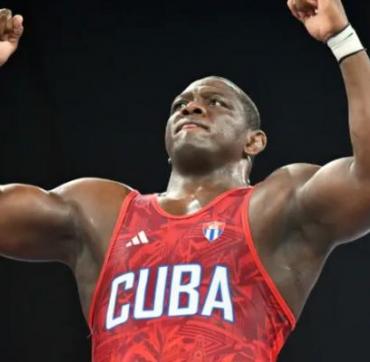

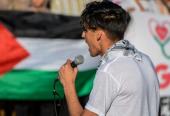

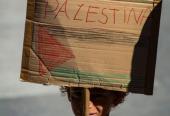
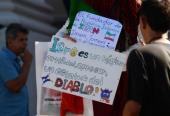
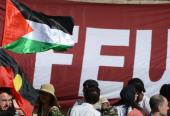
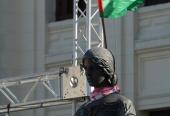

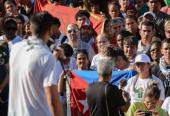


Add new comment